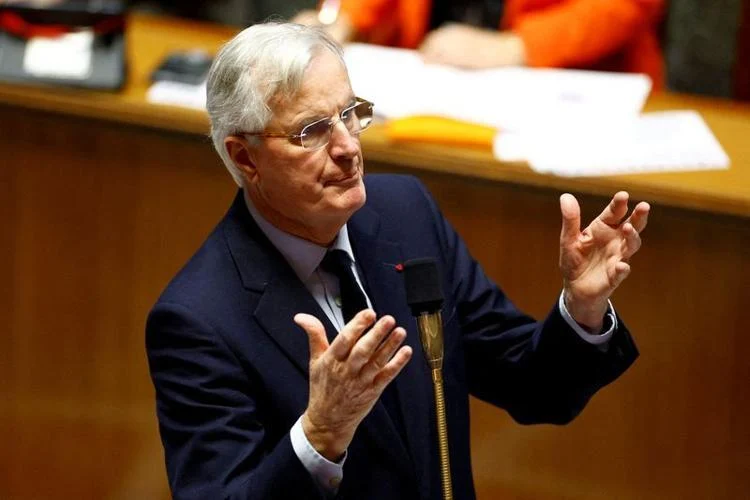French Government Teeters on Brink of Collapse as No-Confidence Motions Mount. The French government, led by Prime Minister Élisabeth Borne, faces a precarious moment as no-confidence motions from both the left-wing and far-right opposition parties threaten its survival.
The political showdown, spurred by widespread dissatisfaction over policy decisions and governance style, has plunged France into a state of uncertainty.
A Fractured Political Landscape
The current crisis stems from simmering tensions within the French National Assembly, where President Emmanuel Macron‘s centrist alliance lost its absolute majority in the 2022 legislative elections. This fragmented parliament has made it increasingly challenging for the government to pass significant reforms.
In a rare alignment of political extremes, the leftist NUPES coalition and the far-right National Rally have both submitted no-confidence motions. The convergence of these ideologically opposed factions underscores the deep divisions within French politics and the growing dissatisfaction with Macron’s administration.
Jean-Luc Mélenchon, leader of the leftist France Insoumise, accused the government of “arrogance and detachment from the people.” Meanwhile, Marine Le Pen of the National Rally called for a change in leadership, citing “a government that no longer represents the will of the French people.
The Catalysts for Crisis
The no-confidence motions were triggered by mounting frustration over key issues, including the government’s handling of economic challenges, pension reform proposals, and immigration policies.
Pension reform, in particular, has become a flashpoint. Macron’s proposal to raise the retirement age from 62 to 64 has drawn massive public protests and fierce opposition in parliament. Critics argue the reform unfairly burdens workers while ignoring alternative solutions.
Additionally, rising inflation, stagnant wages, and concerns over energy security have amplified public discontent. Opposition parties have seized on these grievances to challenge the government’s legitimacy.
How No-Confidence Motions Work in France
Under French law, a no-confidence motion requires an absolute majority of 289 votes in the 577-seat National Assembly to pass. If successful, it would force the resignation of Prime Minister Borne and her cabinet.
The motions will test the unity of opposition parties, as achieving the necessary majority requires cross-party support. While the left and far-right have found common ground in their criticism of the government, their ideological differences could hinder collaboration.
Political analysts believe the outcome hinges on centrist and conservative lawmakers who have yet to declare their stance. “It’s a delicate balance,” said political scientist Stéphane Rozès. “While many are dissatisfied with the government, they may be reluctant to align with the extremes.”
Government’s Response
Prime Minister Borne has defended the administration’s record, emphasizing its efforts to stabilize the economy and address social challenges. In a televised address, she urged lawmakers to reject the motions, warning of the consequences of political instability.
“France cannot afford to plunge into chaos,” Borne stated. “Our government has taken difficult but necessary steps to ensure the long-term prosperity of our nation. This is a time for unity, not division.”
President Macron, who has largely stayed out of the fray, is reportedly preparing contingency plans should the motions succeed. Speculation has mounted that he could dissolve the National Assembly and call for new elections—a high-risk move that could either consolidate his power or further weaken his administration.
Public Sentiment and Protests
As lawmakers prepare to vote on the motions, public sentiment remains volatile. Protests have erupted in major cities, with demonstrators demanding government accountability and rejecting proposed reforms.
Many see the no-confidence motions as a reflection of deeper systemic issues in French politics, including dissatisfaction with the perceived disconnect between leaders and citizens.
“We’re tired of being ignored,” said one protester in Paris. “This government has lost touch with the people it’s supposed to serve.”
What’s at Stake?
The no-confidence votes represent a pivotal moment for Macron’s administration. A successful motion could usher in a period of political turmoil, complicating efforts to address pressing issues such as economic recovery and climate policy.
Conversely, if the government survives, it may emerge weakened, with its ability to implement reforms further diminished. The crisis underscores the challenges of governing in a polarized and fragmented political environment.
A Nation on Edge
As France waits for the outcome of the votes, the stakes are high not just for Macron’s government but for the country’s political future. The results will likely shape the trajectory of French politics in the years to come, determining whether the administration can regain stability or if a new political chapter is about to unfold.
For now, all eyes are on the National Assembly, where the fate of the French government hangs in the balance.
Source: eNCA
In other news – Doc Shebeleza Fights for His Life in ICU: A Nation Holds Its Breath
Doc Shebeleza Fights for His Life in ICU: A Nation Holds Its Breath. South African music legend Doc Shebeleza is in critical condition in an intensive care unit (ICU) following an undisclosed medical emergency.
The iconic artist, known for his vibrant Kwaito hits that defined an era, has left fans and industry peers deeply concerned as they rally around him during this challenging time. Read more



